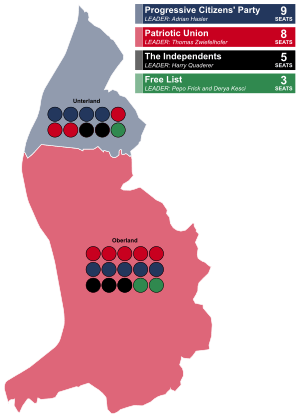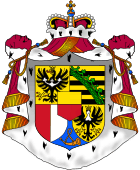2017 Liechtenstein general election
General elections took place in Liechtenstein on 5 February 2017.[1]
| |||||||||||||||||||||||||||||||||||||||||||||||||||||||||||||||||
All 25 seats of the Landtag 13 seats needed for a majority | |||||||||||||||||||||||||||||||||||||||||||||||||||||||||||||||||
|---|---|---|---|---|---|---|---|---|---|---|---|---|---|---|---|---|---|---|---|---|---|---|---|---|---|---|---|---|---|---|---|---|---|---|---|---|---|---|---|---|---|---|---|---|---|---|---|---|---|---|---|---|---|---|---|---|---|---|---|---|---|---|---|---|---|
| |||||||||||||||||||||||||||||||||||||||||||||||||||||||||||||||||
 Popular vote and seat totals by constituency. As this is a PR election, seat totals are determined by popular vote in each constituency. | |||||||||||||||||||||||||||||||||||||||||||||||||||||||||||||||||
| |||||||||||||||||||||||||||||||||||||||||||||||||||||||||||||||||
Principality of Liechtenstein
|
|---|
 |
| This article is part of a series on the politics and government of Liechtenstein |
Background
The previous elections in 2013 saw the Patriotic Union lose five seats and their majority in the Landtag. The Progressive Citizens' Party also lost a seat, but became the governing party in part due to the entry of The Independents, a new party that won four seats.
The 2013 elections marked the first time that four parties had won seats in the Landtag,[2] with suggestions that protest voting against austerity policies or reduced partisanship amongst voters may have been factors.[2][3][4]
Electoral system
The 25 members of the Landtag are elected by open list proportional representation from two constituencies, Oberland with 15 seats and Unterland with 10 seats. The electoral threshold is 8%.[5]
Unterland consists of Eschen, Gamprin, Mauren, Ruggell and Schellenberg; Oberland consists of Balzers, Planken, Schaan, Triesen, Triesenberg and Vaduz.
Results
| Party | Votes | % | +/– | Seats | +/– |
|---|---|---|---|---|---|
| Progressive Citizens' Party | 68,673 | 35.2 | –4.8 | 9 | –1 |
| Patriotic Union | 65,742 | 33.7 | +0.2 | 8 | 0 |
| The Independents | 35,885 | 18.4 | +3.1 | 5 | +1 |
| Free List | 24,595 | 12.6 | +1.5 | 3 | 0 |
| Total | 194,895 | 100 | — | 25 | 0 |
| Valid ballots | 14,763 | 95.8 | |||
| Invalid/blank ballots | 645 | 4.2 | |||
| Total | 15,408 | 100 | |||
| Registered voters/turnout | 19,806 | 77.8 | |||
| Source: Landstagwahlen | |||||
Reactions
Observers noted the success of the populist and "fringe groups"[6] DU and FL – particularly the former – as well as the losses of the ruling parties at their expense.[7][6]
References
- "Landtagswahlen 2017: Rekordzahl an Kandidaten". Retrieved 2016-12-29.
- "New Independent party rattles Liechtenstein vote". Global Post. 3 February 2013. Retrieved 21 July 2016.
- "Politics in tiny Liechtenstein shaken up by surprise election success of independents". Fox News. 3 February 2013. Retrieved 21 July 2016.
- "Mehrheit der Stimmzettel wurden angepasst". Vaterland. 4 February 2013. Retrieved 4 February 2013.
- Article 55 (1) of the Volksrechtegesetz (Law of People's Rights) Gesetze.li
- Stefanini, Sara (5 February 2017). "Liechtenstein's Populists Gain Ground". Politico. Retrieved 5 February 2017.
- "Liechtenstein Populist Party Gains Ground in Parliamentary Elections". Deutsche Welle. February 5, 2017. Retrieved February 5, 2017.
.jpg)
.jpg)